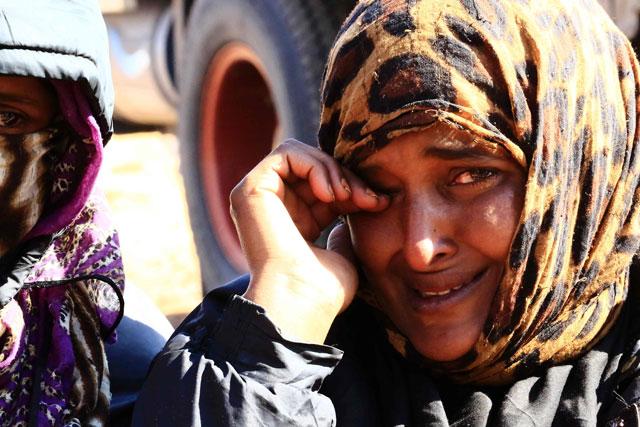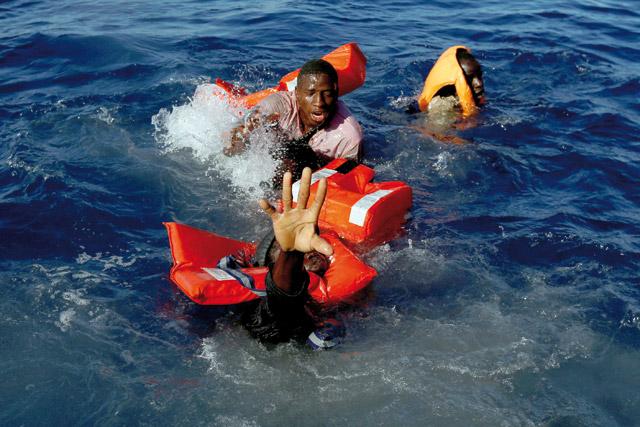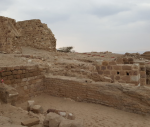You are here
EU leaders back Libyans to curb new migrant wave
By Reuters - Feb 04,2017 - Last updated at Feb 04,2017

Sub-Saharan migrants rest aboard the former fishing trawler Golfo Azzurro of the Spanish NGO Proactiva Open Arms, following a rescue operation near the coasts of Libya in the central Mediterranean Sea, on Friday (Reuters photo)
VALLETTA — European Union leaders placed a bet on Libya’s fragile government to help them prevent a new wave of African migrants this spring, offering Tripoli more money and other assistance to beef up its frontier controls.
Meeting in Malta — in the sea lane to Italy where more than 4,500 people drowned last year — the leaders addressed legal and moral concerns about having Libyan coastguards force people ashore by pledging to improve conditions in migrant camps there.
“If the situation stays as it is now, in a few weeks we will have a humanitarian crisis and people will start pointing fingers, saying Europe has done nothing,” said Joseph Muscat, the prime minister of Malta, which currently holds the presidency of the bloc.
“With this agreement... there is one first decent shot in trying to get a proper management of migration flows across the central Mediterranean.”
Aid groups, however, accused the EU, of abandoning humanitarian values and misrepresenting conditions in Libya, where the UN-backed government of Fayez Al Seraj has only a shaky and partial hold on the sprawling desert nation.
Medecins Sans Frontieres, which works on the ground, said the summit proved EU leaders were “delusional” about Libya.
“Today was not about saving lives; it’s clear that the EU is ready to sacrifice thousands of vulnerable men, women and children in order to stop them reaching European shores.”
The chaos in Libya has thwarted any hope of a quick fix in the way that a controversial EU deal with Turkey a year ago led to a virtual halt to a migrant route to Germany via Greece along which more than a million asylum-seekers travelled in 2015.
On Thursday, Seraj signed an agreement with Italy, which offered 200 million euros ($215 million) of its own. Rome fears new arrivals this spring, following a record 181,000 irregular immigrants last year, would put pressure on services and risk a popular backlash — especially since its EU neighbours are no longer letting most migrants travel north out of Italy.
There are legal and security challenges in cooperating on migration with Libya, where camps for migrants are run by the government and the militias alike, and offer dire conditions.
The bloc would be in violation of international law if its own vessels sent people back to Libya. Hence it wants to beef up Libya’s coast guard to do it for them, and help Tripoli seal its southern border so fewer people get in.
Many EU governments are sceptical that the latest measures can have much effect on migration. One senior diplomat called it a “long shot”. Several said the declaration was intended partly to appease Italian demands that the Union be seen
to be acting.
Longer term, Europeans are placing hopes in using their aid muscle in Africa to reduce incentives for people to leave and give governments there incentives to take back citizens who fail to win asylum in Europe. Deporting more of those who reach Italy is part of a wider plan to send signals to Africans not to risk the Sahara and Mediterranean in the vain hope of a better life.
At Agadez in Niger, numbers gathering to cross the Sahara have plunged in recent months, which some EU officials think may indicate that strategy of deterrence is working. However, people smugglers may just have altered routes.
Related Articles
VALLETTA — The European Union plans new measures to deter migrants crossing the Mediterranean from Libya, officials said, as Malta urged the
BRUSSELS — The European Union needs to reach a deal with Libya to curb the flow of migrants trying to sail on smugglers’ boats to Italy, Mal
ROME — Rescuers saved 484 migrants from boats in the Mediterranean on Saturday and found the bodies of seven men who had died in the attempt

















